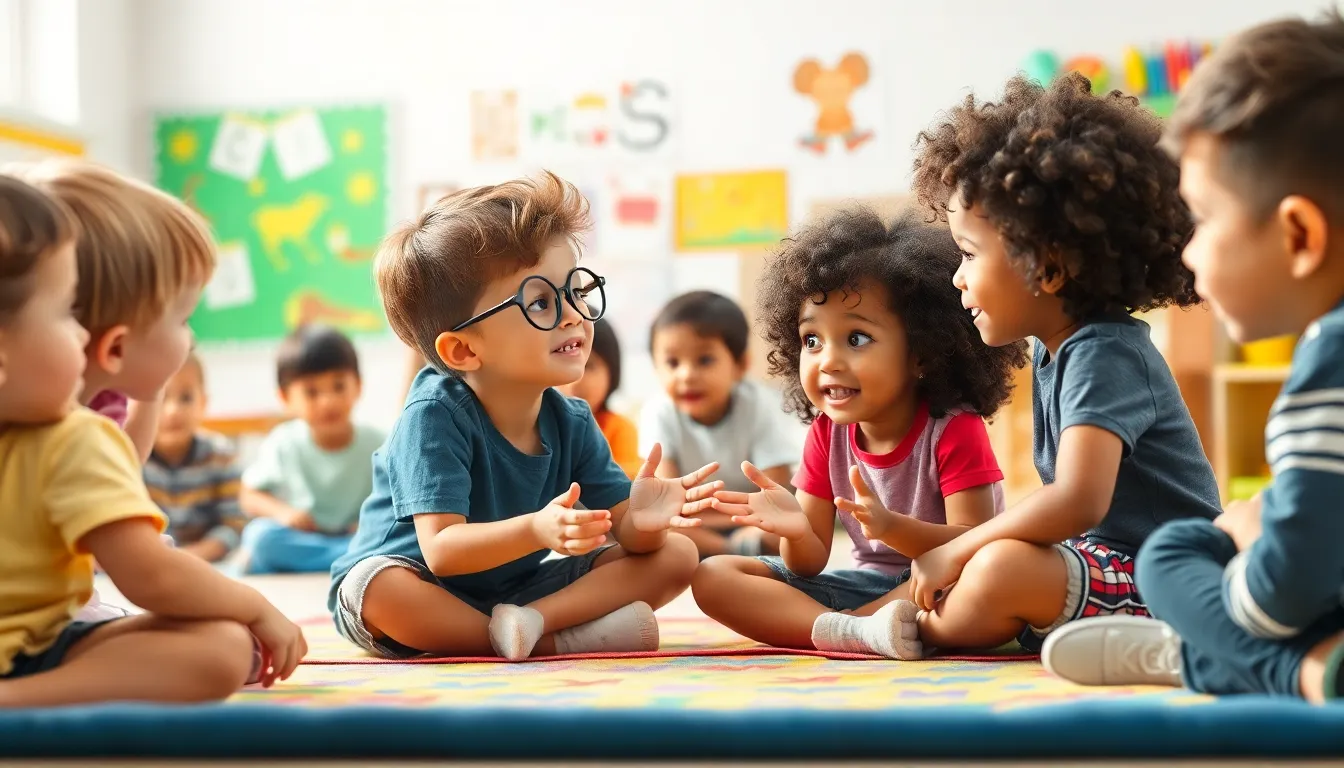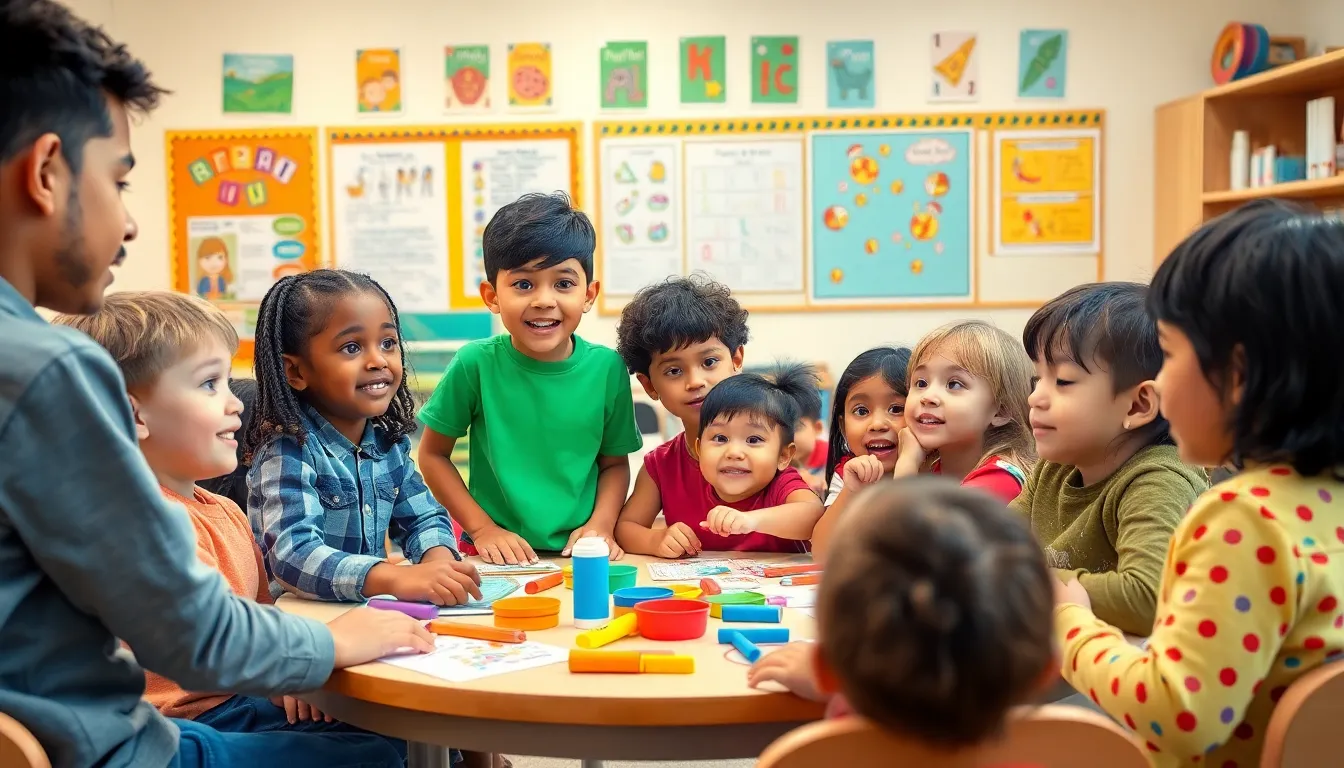Physical Address
304 North Cardinal St.
Dorchester Center, MA 02124
Physical Address
304 North Cardinal St.
Dorchester Center, MA 02124

Kids can be like little tornadoes of emotions, spinning wildly when disagreements arise. Instead of letting those tempests wreak havoc, why not equip them with the tools to navigate stormy seas? Conflict resolution activities for kids are not just fun and games; they’re essential life skills in the making.
Engaging in conflict resolution activities fosters essential skills in children. These activities equip kids to handle disagreements proactively, nurturing their growth.
Participating in conflict resolution activities enhances social skills. Role-playing scenarios allows children to practice communication and negotiation techniques. Collaborating with peers teaches teamwork and respect for differing opinions. Building empathy becomes more accessible through guided discussions about feelings and experiences. Observing positive interactions reinforces healthy behaviors. Kids learn to express their thoughts clearly, which raises their confidence in social situations.
Engaging in conflict resolution activities boosts emotional intelligence. Identifying emotions during conflicts helps children recognize their feelings and the feelings of others. Understanding emotional triggers guides kids to manage their responses more effectively. Activities that focus on active listening improve self-regulation and empathy. Encouraging reflection on conflicts fosters resilience and adaptability. Developing these skills prepares kids for future challenges, enabling them to approach disputes with maturity.

Engaging in various conflict resolution activities helps children develop essential skills for managing disagreements. Activities can be categorized into group activities and individual activities.
Group activities promote teamwork and collaboration among children. Team-building exercises create scenarios where kids must resolve conflicts together. Role-playing encourages them to act out different perspectives, allowing an exploration of emotions and viewpoints. In structured debates, children practice articulating their sides and listening to others. Additionally, cooperative games require players to strategize and communicate effectively to achieve common goals. These formats foster social skills and nurture empathy, equipping children with tools for handling conflicts in real life.
Individual activities focus on self-reflection and personal skill development. Journaling provides an outlet for children to express their feelings and thoughts on conflicts. Engaging in mindfulness exercises teaches kids how to manage emotions proactively. Personal role-play allows them to rehearse responses to common conflict scenarios privately. Additionally, reading conflict-resolution stories cultivates understanding of different perspectives and approaches. These solo endeavors enhance emotional intelligence and build resilience, preparing children to navigate disputes confidently.
Engaging kids in creative conflict resolution games promotes understanding and collaboration. These activities encourage children to explore different perspectives while mastering conflict management skills.
Role-playing scenarios allow children to act out conflicts in a safe environment. Kids can take on various roles, facilitating empathy and understanding. Assigning roles helps them understand different viewpoints. Include scenarios relevant to their daily interactions, such as sharing toys or dealing with disagreements. Observers in the group can provide constructive feedback, enhancing communication skills. Advantages of role-playing include developing problem-solving abilities and fostering teamwork.
Storytelling techniques offer another engaging way for kids to learn about conflict resolution. Children can create stories featuring characters facing challenges. They explore potential solutions through discussions about the story. Encouraging kids to share personal experiences as stories enhances relatability. Using guided questions, adults can navigate conversations about emotions and decisions within the tales. This method strengthens listening skills and encourages critical thinking. Crafting stories together fosters creativity, builds connections, and prepares kids for real-life conflicts.
Creating a supportive environment enhances engagement during conflict resolution activities. Kids need to feel safe and respected for effective collaboration. Setting clear ground rules helps establish boundaries. Encourage participants to share their thoughts without fear of judgment. Moreover, designating a comfortable space for discussions can foster a sense of security.
Encouraging open communication is vital for effective conflict resolution. Kids benefit from expressing their feelings and thoughts freely. Use prompts to help them articulate their emotions clearly. Facilitate active listening by having each child repeat what others say before responding. Create opportunities for discussions through circle time or group sessions. Additionally, model positive communication behaviors, such as using “I” statements, to guide children in expressing their needs constructively.
Teaching conflict resolution skills to kids is essential for their emotional and social development. Engaging in various activities not only equips them with the tools to handle disputes but also fosters empathy and resilience. By incorporating both group and individual activities, children learn to navigate conflicts with confidence and maturity.
Creating a supportive environment where open communication thrives is crucial for these activities to be effective. As children practice these skills through role-playing, storytelling, and games, they become better equipped to manage their emotions and resolve conflicts constructively. Ultimately, these experiences lay the foundation for healthier relationships and improved emotional intelligence in their future interactions.